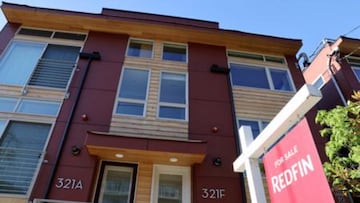Why does Goldman Sachs predict the US housing market will continue to fall in 2023?
The red-hot housing market has been showing signs of cooling. A new research note from Goldman Sachs chief economist augurs further declining prices.

Housing prices across the United States soared during the covid-19 pandemic but red-hot inflation numbers across the economy have prompted the Federal Reserve to move aggressively. As a consequence of four consecutive rate increases, two three-quarter percentage hikes in June and July, borrowing cost have become more expensive raising mortgages for homebuyers to their highest since 2019.
Would-be home buyers are now being priced out of the market and sellers have had to reconsider their asking price or even whether to put their house up for sale. This has led to a slowdown in the number homes trading hands and building permits. Goldman Sachs Chief Economist Jan Hatzius says that the housing downturn has “further to fall.”
Also see:
What is pushing down housing prices?
“The sustained reduction in affordability, waning pandemic tailwind, and recent decline in purchasing intentions suggest that home sales are likely to fall further on net,” the research note from Goldman Sachs said. The housing price increases during the pandemic were driven by workers, who sought more spacious homes as they were allowed to do their jobs remotely, as well as institutional investors. Historically low interest rates also played a major role to fuel the surge in prices.
This caused many markets around the US to become overvalued, pushing the average home price over the half-million-dollar mark in twenty of the top hundred markets. Increased prices and higher mortgage rates have now weakened demand reducing the imbalance with the housing supply.
But its effects haven’t been uniform across the nation. “Existing home sales and building permits have fallen more sharply this year in regions where they increased the most in the earlier part of the pandemic,” according to Goldman Sachs.
How far will home prices fall?
In the second quarter of 2021 house prices rose 17.7 percent year-on-year according to the Federal Housing Finance Agency House Price Index (FHFA) down one point from the previous quarter. Goldman Sachs is forecasting the slowdown will accelerate in the third quarter increasing only 8.5 percent and dropping to 3 percent in the fourth quarter.
The price of houses will be up 14 percent overall year-on-year at the end of 2022. Going into the new year though the researchers predict that home price growth will “stall completely” averaging zero percent next year. In some regions “outright declines in national home prices are possible and appear quite likely.” However, Goldman Sachs states that “large declines seem unlikely.”
Declining home values often go hand-in-hand with economic recessions Goldman Sachs researchers noted. However, despite employment numbers slowing, “the labor market remains robust” and they forecast that it will likely remain so.
Normally, some of those who would lose their job would be forced to sell their home, increasing supply which would further put downward pressure on house prices, but that is unlikely in this downturn. “Household balance sheets are extremely strong and loan delinquency rates are likely to remain historically low,” they pointed out.
Additional factors affecting housing prices the researchers mentioned, although inventories have begun to normalize and housing starts are rebounding, bottlenecks in the supply chain will still delay completion times limiting an influx of supply.






